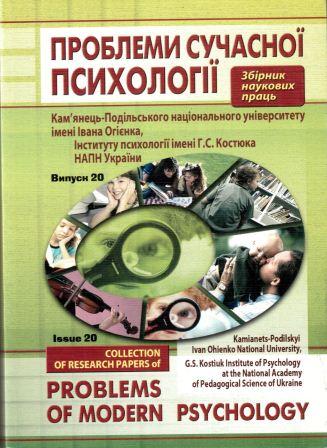Особливості резервної мотивації
DOI:
https://doi.org/10.32626/2227-6246.2013-20.%25pКлючові слова:
резервна мотивація, мотиваційна криза, долання критичних життєвих ситуацій, особистісна змістовність.Анотація
У статті теоретично проаналізовано особливості резервної мотива-
ції у порівнянні з явищем резигнації, ефектами автономізації мотиву й
«чуття потоку» за критеріями «відсутність–наявність особистої зацікав-
леності у виконанні завдання» та «жорсткі зовнішні вимоги–внутріш-
ня свобода у виборі засобів виконання завдання». Наведено результати
апробації авторського опитувальника резервної мотивації особистості.
Емпірично показано відмінності резервної мотивації та адаптивної по-
ведінки. На основі емпіричних даних уточнено зміст резервної мотива-
ції як мотивації долання критичних життєвих ситуацій, яка виявляєть-
ся у наданні людиною меті власних дій особистісної змістовності.
Посилання
Зубцов Ю. Михай Чиксентмихайи: «Мы можем научиться
быть счастливыми» / Ю. Зубцов // Psychologies.– №77. –
сентябрь 2012. – С. 123-126.
Леонов А. И. Внутренняя резигнация: симптомы, причины,
пути преодоления / А. Леонов. – Электр. ресурс: Режим до-
ступа. – www.hr-land.com.
Олпорт Г. Становление личности: Избранные труды [пер. с
англ.] / Г. Олпорт. – М. : Смысл, 2002. – 462 с. (С.301-309)
Психология развития личности. Средний возраст, старе-
ние, смерть / [под общ.ред. А. А. Реана]. – СПб.: прайм-
ЕВРОЗНАК, 2007. – 384 с.
Розов В. І. Методики оцінки і самооцінки адаптивних інди-
відуально-психологічних властивостей особистості / В. Роз-
ов // Практична психологія та соціальна робота. – №6. –
– С.30-48.
Хаирова С. И. К созданию адаптированного варианта методи-
ки SOCQ (WaysOfCopingQuestionnaire) / С. Хаирова // Прак-
тична психологія та соціальна робота. – №1. – 2003. – С.9-16.
Штепа О. С. Мотиваційне здоров’я особистості / О. Штепа //
Практична психологія та соціальна робота. – №8. – 2012. –
С.1-4.
##submission.downloads##
Як цитувати
Номер
Розділ
Ліцензія
Редакція має повне право публікувати у Збірнику оригінальні наукові статті як результати теоретичних і експериментальних досліджень, які не знаходяться на розгляді для опублікування в інших виданнях. Автор передає редколегії Збірника права на розповсюдження електронної версії статті, а також електронної версії англомовного перекладу статті (для статей українською та російською мовою) через будь-які електронні засоби (розміщення на офіційному web-сайті Збірника, в електронних базах даних, репозитаріях та ін).
Автор публікації зберігає за собою право без узгодження з редколегією та засновниками використовувати матеріали статті: а) частково чи повністю в освітніх цілях; б) для написання власних дисертацій; в) для підготовки абстрактів, доповідей конференцій та презентацій.
Автор публікації має право розміщувати електронні копії статті (у тому числі кінцеву електронну версію, завантажену з офіційного web-сайту Збірника) на:
- персональних web-ресурсах усіх Авторів (web-сайти, web-сторінки, блоги тощо);
- web-ресурсах установ, де працюють Автори (включно з електронними інституційними репозитаріями);
- некомерційних web-ресурсах відкритого доступу (наприклад, arXiv.org).
Але в усіх випадках обов’язковою є наявність бібліографічного посилання на статтю або гіперпосилання на її електронну копію, що містяться на офіційному сайті Збірника.






